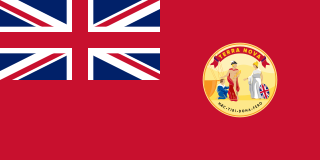
Sir Ambrose Shea was a political and business figure in colonial Newfoundland who later served as Governor of the Bahamas. He was one of two Newfoundland delegates to the Québec Conference that led to Canadian confederation. Shea was born in St. John's, Newfoundland Colony, the fifth son of Henry Shea and Eleanor Ryan. His father had emigrated from County Tipperary, Ireland. Ambrose Shea worked for a time on The Newfoundlander, a family-owned newspaper, before going into business for himself. By the 1850s, he was a successful merchant who also dealt in insurance, and acted as the agent for the transatlantic steamer trade. He continued to operate the business during most of his political career. In addition, he helped found the Newfoundland Natives Society in 1840, serving on the management committee in 1842, and as president in 1846.

Sir Hugh Hoyles was a politician and lawyer who served as the third premier of the colony of Newfoundland. Hoyles was the first premier of Newfoundland to have been born in the colony, and served from 1861 to 1865. Born in St. John's, he was the son of Newman Hoyles, the first leader of the Tory Party.
The 10th Newfoundland general election was held on 7 November 1865 to elect members of the 9th General Assembly of Newfoundland in the Dominion of Newfoundland. The Conservative Party led by Frederick Carter formed the government.
George James Hogsett was a lawyer and political figure in Newfoundland. He represented Placentia and St. Mary's from 1852 to 1861 and Harbour Main from 1865 to 1869 in the Newfoundland and Labrador House of Assembly as a Liberal.

The 8th Newfoundland general election was held in 1859 to elect members of the 7th General Assembly of Newfoundland in the Dominion of Newfoundland. 18 Liberals and 12 Conservatives were elected. The Liberal Party led by John Kent formed the government.
The 7th Newfoundland general election was held in 1855 to elect members of the 6th General Assembly of Newfoundland. This was the first election after responsible government was introduced to the Dominion of Newfoundland. The Liberal Party led by Philip Francis Little formed the government.
The 6th Newfoundland general election was held in 1852 to elect members of the 5th General Assembly of Newfoundland in the Dominion of Newfoundland. There were 9 Liberals and 6 Conservatives elected.
The 5th Newfoundland general election was held in 1848 to elect members of the 4th General Assembly of Newfoundland in the Dominion of Newfoundland. The use of two separate bodies, an elected assembly and an appointed Legislative Council, was resumed; the experiment with combining the two bodies which had been initiated in 1842 was terminated. While the exact party composition of the Newfoundland House of Assembly following this election is unknown; the Liberals did enjoy a majority.
The 4th Newfoundland general election was held in 1842 to elect members of the 3rd General Assembly of Newfoundland in the Dominion of Newfoundland. The elected assembly with 15 members and the appointed Legislative Council with 10 members were combined into a unicameral legislature.
The 15th Newfoundland general election was held in 1882 to elect members of the 14th General Assembly of Newfoundland in the Dominion of Newfoundland. The Conservative Party led by William Vallance Whiteway formed the government.

The 13th Newfoundland general election was held in 1874 to elect members of the 12th General Assembly of Newfoundland in the Dominion of Newfoundland. The Conservative Party led by Frederick Carter formed the government.
The 14th Newfoundland general election was held in 1878 to elect members of the 13th General Assembly of Newfoundland in the Dominion of Newfoundland. The Conservative Party led by William Vallance Whiteway formed the government.
The 2nd Newfoundland general election was held in 1836 in the Colony of Newfoundland. The results of the election were set aside by Henry John Boulton after he discovered some of the writs from the election had not been marked with the official seal. Some felt that this was a pretext used because Liberal reformers had dominated the assembly and a number who had been reelected in 1836 did not run for reelection the following year.

The 12th Newfoundland general election was held in November 1873 to elect members of the 11th General Assembly of Newfoundland in the Dominion of Newfoundland. The Anti-Confederates led by Charles Fox Bennett formed the government; a "new" Conservative party led by Frederick Carter formed the opposition.
The 16th Newfoundland general election was held on 31 October 1885 to elect members of the 15th General Assembly of Newfoundland in the Dominion of Newfoundland. The Reform Party had been created by Robert Thorburn on a platform of "Protestant Rights" after supporters of the Orange Order abandoned the Whiteway government after sectarian riots in 1885 against the government's 'denominational compromise'. Whiteway's Conservative Party was destroyed as a result and Whiteway founded a new Liberal Party. Thorburn's new party swept to power but soon turned away from its sectarian agenda by inviting Catholic Liberals into the Cabinet.
The 17th Newfoundland general election was held on 6 November 1889 to elect members of the 16th General Assembly of Newfoundland in the Dominion of Newfoundland. The Reform Party administration of Robert Thorburn was defeated in favour of the Liberal Party led by William Whiteway formed the government. Reform soon disappeared and was replaced by the Orange Order based Tory Party. This was the first general election held in Newfoundland using the secret ballot.
The 21st Newfoundland general election was held on 31 October 1904 to elect members of the 20th General Assembly of Newfoundland in the Dominion of Newfoundland. The Liberal Party led by Robert Bond formed the government.
The members of the 7th General Assembly of Newfoundland were elected in the Newfoundland general election held in November 1859. The general assembly sat from 1860 to 1861.









